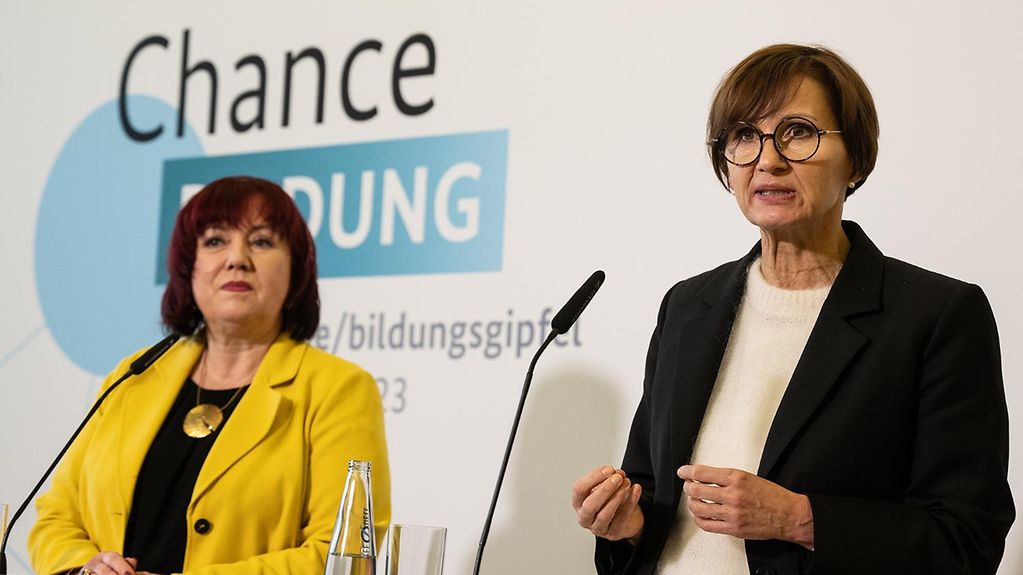2023 Education Summit
Federal Minister of Education Stark-Watzinger called for a new culture of collaboration between the Federal and Länder Governments. In the face of major challenges “we need a trend change with regard to education policy,” the minister stressed on the occasion of the Education Summit in Berlin, adding that renewing the promise of advancement was key.
4 min reading time

Federal Minister of Education Bettina Stark-Watzinger with Astrid-Sabine Busse, Senator for Education, Youth and Family in Berlin.
Photo: BMBF/Hans-Joachim Rickel
630,000 young people did not attend school, undergo vocational training or have a job in 2021. Close to 50,000 young people leave school without graduating every year. Upon transitioning to secondary school, one in five children does not have adequate skills in German or mathematics. These are sobering findings that illustrate the fact that the education landscape is in a crisis.
“The glue of society”
Federal Minister of Education Bettina Stark-Watzinger is not willing to accept this, which is why she organised the two-day Education Summit in Berlin. “Our education system must provide fair opportunities that allow everyone to reach their goals,” the minister stressed at the start of the event. She explained that to be able to reach one’s own goals through effort and achievement was what the promise of advancement was all about. “This is the glue of society,” Stark-Watzinger said, adding that social background still determined educational success far too often.
Federal Minister Bettina Stark-Watzinger invited around 1,000 representatives of the Federal, Länder and communal governments, as well as of academia and the civil society to attend the Education Summit in Berlin, and to spend two days discussing the current challenges of the education system. The Education Summit is a starting point for renewing the promise of advancement, and for a new culture of cooperation between the Federal and Länder Governments in particular. The general direction of the Education Summit was agreed upon by the governing parties in their coalition agreement.
The overall tenor at the Education Summit: schools are facing enormous challenges. The impact of the coronavirus pandemic alone has been massive. Schoolchildren had to deal with closed schools and remote learning, teachers had to use new digital teaching methods, parents had to support their children with their school work they did at home.
There are a range of other problems, too, such as the shortage of teachers, the poor structural condition of many school buildings, and frequently an insufficient degree of digitisation. In addition, schools are currently facing the task to integrate Ukrainian refugee children.
Calling on the “Education Team”
In view of the vast number of challenges, Minister Stark-Watzinger called on all those in charge to cooperate more closely and more effectively. “We also want to send a clear signal today: all of us, who bear responsibility, we are the Education Team.” According to the minister, this includes the communal governments as the local creative force, the Länder governments with their cultural sovereignty, and the Federal Government “where it can really add value”. Further important aspects she mentioned included commitment of the civil society and educational science with its independent expertise.
Stark-Watzinger announced that a task force of stakeholders would be formed for discussing pressing educational matters in a “structured process”. “Let’s all take the leap and try something new and learn from our mistakes.”
Using money for education in a targeted manner
The financial resources of schools and the education system kept coming up in the many discussions held during the Education Summit. For example with regard to the coronavirus catch-up programme, in which the Federal Government is providing one billion euros for offsetting the learning lag of children and teenagers. Or in the planned starting opportunities programme, for which the Federal Government is also providing one billion euros to support around 4,000 schools in socially deprived areas.
Some are asking if this money is enough. Others want to know if it is used in a targeted manner. The minister’s message is this: “Education costs money and education is precious, but money alone will not solve the problems.” She added that it was decisive to ensure that the money “gets to where it is needed most urgently”. The “scattergun approach” had to be a thing of the past, Stark-Watzinger pointed out.
Greater pragmatism is needed
The minister also made a case for pragmatic solutions, for example for realising digitisation in schools. She said that some rules of federalism reached their limits here, for example if the issue of data protection is interpreted in different ways across the 16 federal states.
Stark-Watzinger thinks of the Education Summit as a clear signal sent by all stakeholders of their desire to realise this new start, to monitor our own activities and to actually agree on collective aspects. The Education Summit “is not the destination, it is the departure.”
The Länder governments are in charge of education and schools. However, the Federal Government provides support in the context of its national responsibility, for example:
With the Children’s Daycare Quality Act: in this context, the Federal Government invests a total of four billion euros in early childhood education in 2023 and 2024.
By expanding full-day arrangements for primary school children: the Federal Government is spending 3.5 billion euros for a gradual realisation of a legal claim to a full-day place from 2026 onwards.
With the “Digital Pact for Schools”: 6.5 billion euros are provided by the Federal Government for digitisation in schools.